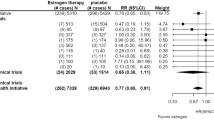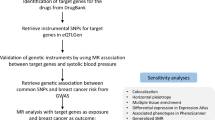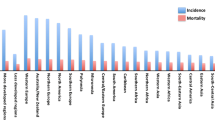Abstract
Introduction
Previous epidemiological studies have indicated an increased risk of breast cancer associated with digitalis medication, though results are inconsistent. We performed this systematic review of available epidemiological studies to clarify the association between digitalis use and the risk of breast cancer.
Methods
A search of studies published through May 2016 in MEDLINE and EMBASE databases was performed, supplemented by manual searches of reference lists. The quality of the included studies was assessed, and relative risks were pooled using both random- and fixed-effect models.
Results
Three case–control studies and six cohort studies were identified. Meta-analysis generated a pooled relative risk of 1.35 (95% confidence interval 1.24–1.46) in both fixed- and random-effect models. The heterogeneity test suggested low heterogeneity across studies. The funnel plot suggested no existence of publication bias. Subgroup analysis by study design revealed an increased risk of breast cancer associated with digitalis use from cohort studies only (relative risk = 1.39, 95% confidence interval 1.27–1.52), rather than from case–control studies. Studies with adjustment for tobacco smoking or body mass index generated lower overall estimates than those not adjusted.
Conclusions
Existing epidemiological evidence regarding the association between digitalis use and the risk of breast cancer remains inconclusive and more well-designed studies are still needed.




Similar content being viewed by others
References
Rifka SM, Pita JC Jr, Loriaux DL. Mechanism of interaction of digitalis with estradiol binding sites in rat uteri. Endocrinology. 1976;99(4):1091–6.
Zhang H, Qian DZ, Tan YS, et al. Digoxin and other cardiac glycosides inhibit HIF-1alpha synthesis and block tumor growth. Proc Natl Acad Sci USA. 2008;105(50):19579–86.
Kepp O, Menger L, Vacchelli E, et al. Anticancer activity of cardiac glycosides: at the frontier between cell-autonomous and immunological effects. Oncoimmunology. 2012;1(9):1640–2.
Slingerland M, Cerella C, Guchelaar HJ, et al. Cardiac glycosides in cancer therapy: from preclinical investigations towards clinical trials. Invest New Drugs. 2013;31(4):1087–94.
Alevizopoulos K, Calogeropoulou T, Lang F, Stournaras C. Na+/K+ ATPase inhibitors in cancer. Curr Drug Targets. 2014;15(10):988–1000.
Ferlay J, Soerjomataram I, Ervik M, et al. GLOBOCAN 2012 v1.0, cancer incidence and mortality worldwide: IARC CancerBase No. 11. Lyon: International Agency for Research on Cancer; 2013.
Chlebowski RT, Anderson GL, Aragaki AK, Prentice R. Breast cancer and menopausal hormone therapy by race/ethnicity and body mass index. J Natl Cancer Inst. 2015. doi:10.1093/jnci/djv327.
Biggar RJ, Wohlfahrt J, Oudin A, et al. Digoxin use and the risk of breast cancer in women. J Clin Oncol. 2011;29(16):2165–70.
Biggar RJ, Wohlfahrt J, Melbye M. Digoxin use and the risk of cancers of the corpus uteri, ovary and cervix. Int J Cancer. 2012;131(3):716–21.
Ahern TP, Tamimi RM, Rosner BA, Hankinson SE. Digoxin use and risk of invasive breast cancer: evidence from the Nurses’ Health Study and meta-analysis. Breast Cancer Res Treat. 2014;144(2):427–35.
Wells GA, Shea B, O’Connell D, et al. The Newcastle–Ottawa Scale (NOS) for assessing the quality of nonrandomised studies in meta-analyses. Available from: http://www.ohri.ca/programs/clinical_epidemiology/oxford.asp. Accessed 1 Jun 2016.
Danielson DA, Jick H, Hunter JR, et al. Nonestrogenic drugs and breast cancer. Am J Epidemiol. 1982;116(2):329–32.
Friedman GD. Digitalis and breast cancer. Lancet. 1984;2(8407):875.
Haux J, Klepp O, Spigset O, Tretli S. Digitoxin medication and cancer; case control and internal dose-response studies. BMC Cancer. 2001;1:11.
Hartz AJ, He T. Cohort study of risk factors for breast cancer in post menopausal women. Epidemiol Health. 2013;35:e2013003.
Aromaa A, Hakama M, Hakulinen T, et al. Breast cancer and use of rauwolfia and other antihypertensive agents in hypertensive patients: a nationwide case–control study in Finland. Int J Cancer. 1976;18(6):727–38.
Ahern TP, Lash TL, Sorensen HT, Pedersen L. Digoxin treatment is associated with an increased incidence of breast cancer: a population-based case–control study. Breast Cancer Res. 2008;10(6):R102.
Couraud S, Dell’Aniello S, Bouganim N, Azoulay L. Cardiac glycosides and the risk of breast cancer in women with chronic heart failure and supraventricular arrhythmia. Breast Cancer Res Treat. 2014;146(3):619–26.
Author information
Authors and Affiliations
Corresponding author
Ethics declarations
Funding
This study was supported by the Fundamental Research Funds for the Central Universities, and the Natural Science Foundation of China (Nos. 81402198, 81500498).
Conflict of interest
Chen Zhang, Shao-Hua Xie, Bingfei Xu, Shi Lu, and Pian Liu have no conflicts of interest that are directly relevant to the content of this study.
Electronic supplementary material
Below is the link to the electronic supplementary material.
Rights and permissions
About this article
Cite this article
Zhang, C., Xie, SH., Xu, B. et al. Digitalis Use and the Risk of Breast Cancer: A Systematic Review and Meta-Analysis. Drug Saf 40, 285–292 (2017). https://doi.org/10.1007/s40264-016-0484-z
Published:
Issue Date:
DOI: https://doi.org/10.1007/s40264-016-0484-z




